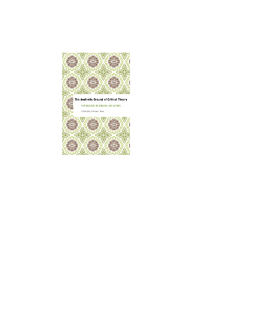
Additional Information
Book Details
Abstract
Walter Benjamin and Theodor W. Adorno are considered today to be the two most significant early theorists in founding critical theory. In their works and correspondence, both thinkers turn to art and the aesthetic as a vital way for understanding modern society and developing philosophical methods. This volume of original essays seeks to understand how they influenced each other and disagreed with each other on fundamental questions about art and the aesthetic. The books deals with a variety of key philosophical questions, such as:
- How does art involve distinctive modes of experience?
- What is the political significance of modern art?
- What does aesthetic experience teach us about the limitations of conceptual thought?
- How is aesthetic experience implicated in the very medium of thought, language?
Ultimately the book presents a systematic argument for the foundational significance of the aesthetic in the development of the early critical theory movement.
This collection of essays presents a comprehensive view on central topics in the fundamental role aesthetic theory and experience play in Adorno and Benjamin. The balance of Critical Theory ‘notorious’ scholars and some young voices in the field is refreshing and opens up to new readings. Insightful and informative, the volume offers a valuable discussion of Critical theory.
Gertrud Koch, Department of Theatre Studies, Freie Universität Berlin
The generative and troubled relationship between Walter Benjamin and Theodor Adorno decisively shaped early Critical Theory, giving rise to some of the most important concepts and issues in modern aesthetics and cultural studies. This insightful collection of essays sheds new light on their relationship – showing why their debates remain highly relevant for politically progressive thought and action.
Lambert Zuidervaart, Professor of Philosophy, Institute for Christian Studies and University of Toronto
This outstanding collection is devoted to unlocking the essential connection between aesthetic experience and philosophical critique, as it is articulated in the tensions and overlooked continuities between Benjamin and Adorno. By going back to the roots of critical theory, the articles in this volume manage the very difficult task of finding original approaches to the state of critical theory today.
María del Rosario Acosta López, Associate Professor of Philosophy, DePaul University
Nathan Ross is associate professor of philosophy at Oklahoma City University. He is the author of On Mechanism in Hegel’s Social and Political Philosophy (2008) as well as a forthcoming book on aesthetic experience in classical German philosophy and critical theory.
Contributors:
Natalia Baeza, Post-doctoral Researcher in Philosophy, University of Florence; Georg Bertram, Professor of Philosophy, Freie Universität Berlin; Rick Elmore, Visiting Assistant Professor, Appalachian State University; Tom Huhn, Professor of Philosophy, New York School of Visual Arts; Eduardo Mendieta, Professor of Philosophy, State University of New York at Stony Brook; Marcia Morgan, Associate Professor of Philosophy and Women’s Studies, Muhlenberg College; Alison Ross, Australian Research Council Future Fellow in Philosophy, Monash University; Andrea Sakoparnig, PhD candidate, Freie Universität Berlin; Surti Singh, Assistant Professor of Philosophy, American University Cairo; Stéphane Symons, Assistant Professor of Aesthetics and Philosophy of Art, Katholieke Universiteit Leuven; Joseph Weiss, Lecturer, DePaul University
